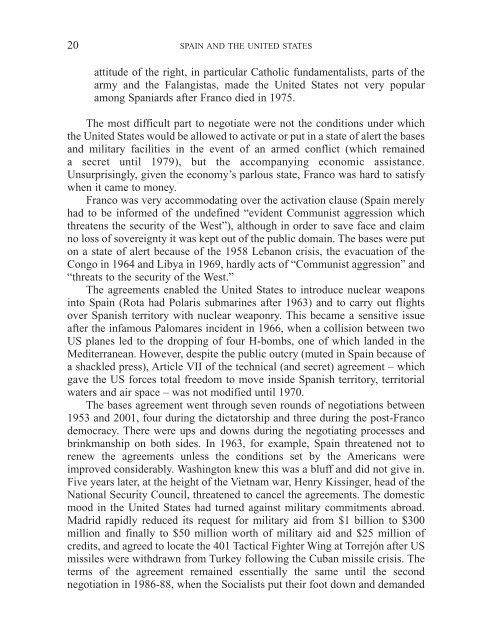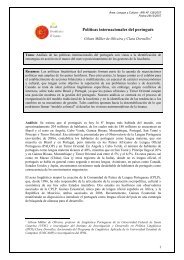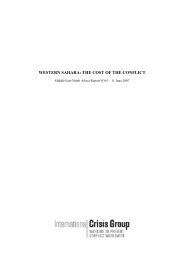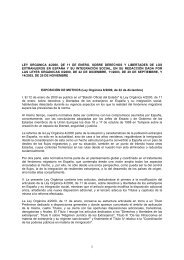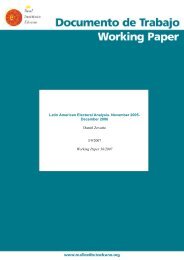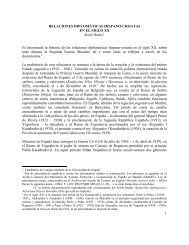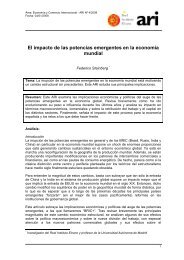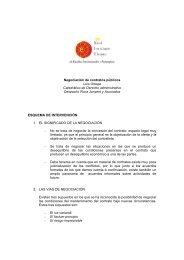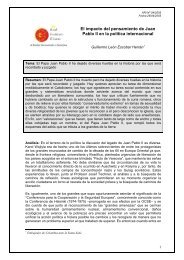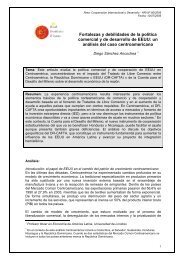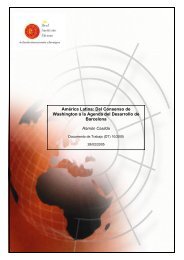Spain and the United States - Real Instituto Elcano
Spain and the United States - Real Instituto Elcano
Spain and the United States - Real Instituto Elcano
Create successful ePaper yourself
Turn your PDF publications into a flip-book with our unique Google optimized e-Paper software.
20<br />
SPAIN AND THE UNITED STATES<br />
attitude of <strong>the</strong> right, in particular Catholic fundamentalists, parts of <strong>the</strong><br />
army <strong>and</strong> <strong>the</strong> Falangistas, made <strong>the</strong> <strong>United</strong> <strong>States</strong> not very popular<br />
among Spaniards after Franco died in 1975.<br />
The most difficult part to negotiate were not <strong>the</strong> conditions under which<br />
<strong>the</strong> <strong>United</strong> <strong>States</strong> would be allowed to activate or put in a state of alert <strong>the</strong> bases<br />
<strong>and</strong> military facilities in <strong>the</strong> event of an armed conflict (which remained<br />
a secret until 1979), but <strong>the</strong> accompanying economic assistance.<br />
Unsurprisingly, given <strong>the</strong> economy’s parlous state, Franco was hard to satisfy<br />
when it came to money.<br />
Franco was very accommodating over <strong>the</strong> activation clause (<strong>Spain</strong> merely<br />
had to be informed of <strong>the</strong> undefined “evident Communist aggression which<br />
threatens <strong>the</strong> security of <strong>the</strong> West”), although in order to save face <strong>and</strong> claim<br />
no loss of sovereignty it was kept out of <strong>the</strong> public domain. The bases were put<br />
on a state of alert because of <strong>the</strong> 1958 Lebanon crisis, <strong>the</strong> evacuation of <strong>the</strong><br />
Congo in 1964 <strong>and</strong> Libya in 1969, hardly acts of “Communist aggression” <strong>and</strong><br />
“threats to <strong>the</strong> security of <strong>the</strong> West.”<br />
The agreements enabled <strong>the</strong> <strong>United</strong> <strong>States</strong> to introduce nuclear weapons<br />
into <strong>Spain</strong> (Rota had Polaris submarines after 1963) <strong>and</strong> to carry out flights<br />
over Spanish territory with nuclear weaponry. This became a sensitive issue<br />
after <strong>the</strong> infamous Palomares incident in 1966, when a collision between two<br />
US planes led to <strong>the</strong> dropping of four H-bombs, one of which l<strong>and</strong>ed in <strong>the</strong><br />
Mediterranean. However, despite <strong>the</strong> public outcry (muted in <strong>Spain</strong> because of<br />
a shackled press), Article VII of <strong>the</strong> technical (<strong>and</strong> secret) agreement – which<br />
gave <strong>the</strong> US forces total freedom to move inside Spanish territory, territorial<br />
waters <strong>and</strong> air space – was not modified until 1970.<br />
The bases agreement went through seven rounds of negotiations between<br />
1953 <strong>and</strong> 2001, four during <strong>the</strong> dictatorship <strong>and</strong> three during <strong>the</strong> post-Franco<br />
democracy. There were ups <strong>and</strong> downs during <strong>the</strong> negotiating processes <strong>and</strong><br />
brinkmanship on both sides. In 1963, for example, <strong>Spain</strong> threatened not to<br />
renew <strong>the</strong> agreements unless <strong>the</strong> conditions set by <strong>the</strong> Americans were<br />
improved considerably. Washington knew this was a bluff <strong>and</strong> did not give in.<br />
Five years later, at <strong>the</strong> height of <strong>the</strong> Vietnam war, Henry Kissinger, head of <strong>the</strong><br />
National Security Council, threatened to cancel <strong>the</strong> agreements. The domestic<br />
mood in <strong>the</strong> <strong>United</strong> <strong>States</strong> had turned against military commitments abroad.<br />
Madrid rapidly reduced its request for military aid from $1 billion to $300<br />
million <strong>and</strong> finally to $50 million worth of military aid <strong>and</strong> $25 million of<br />
credits, <strong>and</strong> agreed to locate <strong>the</strong> 401 Tactical Fighter Wing at Torrejón after US<br />
missiles were withdrawn from Turkey following <strong>the</strong> Cuban missile crisis. The<br />
terms of <strong>the</strong> agreement remained essentially <strong>the</strong> same until <strong>the</strong> second<br />
negotiation in 1986-88, when <strong>the</strong> Socialists put <strong>the</strong>ir foot down <strong>and</strong> dem<strong>and</strong>ed


